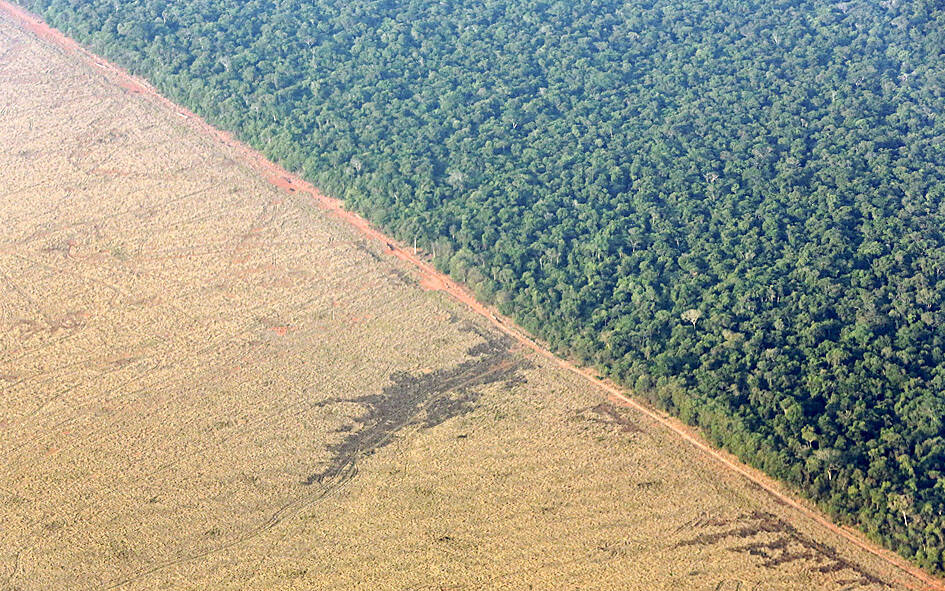Deforestation last year slowed in all of Brazil’s nature biomes for the first time in six years, according to a report issued months before the country hosts a major UN climate conference at the end of this year.
The total area deforested in South America’s biggest country was 32.4 percent lower than in 2023, or about 1.24 million hectares, the report by monitoring agency MapBiomas said yesterday.
It was the second year in a row of lower deforestation, with 2023 also recording a decrease of 11 percent from the previous year.

Photo: Reuters
Brazilian President Luiz Inacio Lula da Silva has pledged to eradicate illegal deforestation by 2030 and wants to make Brazil a leader in combating global warming.
Yet despite the advances, Brazil still lost about 3,403 hectares of native vegetation daily last year.
Brazil is home to six biomes, each with its own climate, vegetation and animal life: the Amazon, the Atlantic Forest, the Cerrado, the Caatinga, the Pantanal and the Pampa.
In the Amazon, the largest tropical rainforest on the planet, logging destroyed an average of 1,035 hectares daily, or “about seven trees per second,” the report said, mostly to clear land for agriculture.
The Cerrado, a tropical savanna rich in biodiversity, was the biome most affected by clearing for the second year in a row, losing 652,197 hectares.
Two-thirds of indigenous lands recorded no deforestation last year, the report said.
Deforestation is the intentional destruction of vegetation, and does not include forest fires, which reached record levels in Brazil last year.
COP30, the next round of UN climate talks, are due to take place in the Amazonian city of Belem in November.

CHAOS: Iranians took to the streets playing celebratory music after reports of Khamenei’s death on Saturday, while mourners also gathered in Tehran yesterday Iranian Supreme Leader Ayatollah Ali Khamenei was killed in a major attack on Iran launched by Israel and the US, throwing the future of the Islamic republic into doubt and raising the risk of regional instability. Iranian state television and the state-run IRNA news agency announced the 86-year-old’s death early yesterday. US President Donald Trump said it gave Iranians their “greatest chance” to “take back” their country. The announcements came after a joint US and Israeli aerial bombardment that targeted Iranian military and governmental sites. Trump said the “heavy and pinpoint bombing” would continue through the week or as long

TRUST: The KMT said it respected the US’ timing and considerations, and hoped it would continue to honor its commitments to helping Taiwan bolster its defenses and deterrence US President Donald Trump is delaying a multibillion-dollar arms sale to Taiwan to ensure his visit to Beijing is successful, a New York Times report said. The weapons sales package has stalled in the US Department of State, the report said, citing US officials it did not identify. The White House has told agencies not to push forward ahead of Trump’s meeting with Chinese President Xi Jinping (習近平), it said. The two last month held a phone call to discuss trade and geopolitical flashpoints ahead of the summit. Xi raised the Taiwan issue and urged the US to handle arms sales to

State-run CPC Corp, Taiwan (CPC, 台灣中油) yesterday said that it had confirmed on Saturday night with its liquefied natural gas (LNG) and crude oil suppliers that shipments are proceeding as scheduled and that domestic supplies remain unaffected. The CPC yesterday announced the gasoline and diesel prices will rise by NT$0.2 and NT$0.4 per liter, respectively, starting Monday, citing Middle East tensions and blizzards in the eastern United States. CPC also iterated it has been reducing the proportion of crude oil imports from the Middle East and diversifying its supply sources in the past few years in response to geopolitical risks, expanding

Pro-democracy media tycoon Jimmy Lai’s (黎智英) fraud conviction and prison sentence were yesterday overturned by a Hong Kong court, in a surprise legal decision that comes soon after Lai was jailed for 20 years on a separate national security charge. Judges Jeremy Poon (潘兆初), Anthea Pang (彭寶琴) and Derek Pang (彭偉昌) said in the judgement that they allowed the appeal from Lai, and another defendant in the case, to proceed, as a lower court judge had “erred.” “The Court of Appeal gave them leave to appeal against their conviction, allowed their appeals, quashed the convictions and set aside the sentences,” the judges